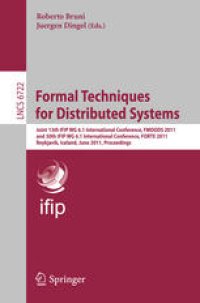
Ebook: Formal Techniques for Distributed Systems: Joint 13th IFIP WG 6.1 International Conference, FMOODS 2011, and 30th IFIP WG 6.1 International Conference, FORTE 2011, Reykjavik, Iceland, June 6-9, 2011. Proceedings
- Tags: Computer Communication Networks, Programming Techniques, Software Engineering, Programming Languages Compilers Interpreters, Logics and Meanings of Programs, Mathematical Logic and Formal Languages
- Series: Lecture Notes in Computer Science 6722 Programming and Software Engineering
- Year: 2011
- Publisher: Springer-Verlag Berlin Heidelberg
- Edition: 1
- Language: English
- pdf
This book constitutes the refereed proceedings of the 13th IFIP WG 6.1 International Conference on Formal Methods for Open Object-Based Distributed Systems, FMOODS 2011, and the 31st IFIP WG 6.1 Formal Techniques for Networked and Distributed Systems, FORTE 2011, held in Reykjavik, Island, in June 2011, as one of the DisCoTec 2011 events. The 21 revised full papers presented together with one invited talk were carefully reviewed and selected from 65 submissions. The topics covered are formal verification, formal modeling and specification, run-time monitoring, and testing to address challenges in many different application areas, including dynamic and ad hoc networks, mobile and adaptive computation, reactive and timed systems, business processes, and distributed and concurrent systems and algorithms.
This book constitutes the refereed proceedings of the 13th IFIP WG 6.1 International Conference on Formal Methods for Open Object-Based Distributed Systems, FMOODS 2011, and the 31st IFIP WG 6.1 Formal Techniques for Networked and Distributed Systems, FORTE 2011, held in Reykjavik, Island, in June 2011, as one of the DisCoTec 2011 events. The 21 revised full papers presented together with one invited talk were carefully reviewed and selected from 65 submissions. The topics covered are formal verification, formal modeling and specification, run-time monitoring, and testing to address challenges in many different application areas, including dynamic and ad hoc networks, mobile and adaptive computation, reactive and timed systems, business processes, and distributed and concurrent systems and algorithms.